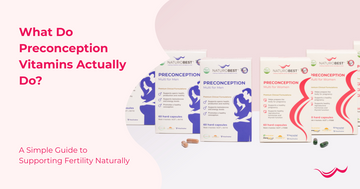Debunking Common Misconceptions About Preconception
by NaturoBest Naturopath Team on Nov 08, 2023

There is a lot of information out there about what to do when you are preparing to have a baby. Making sense of it all can feel quite overwhelming. It is important to seek information from a qualified healthcare provider when preconception planning for trusted, evidence-based advice.
Taking a high-quality preconception multivitamin alongside following a preconception care plan can help prepare the body for pregnancy.
Key Takeaways:
· Not everyone can meet their nutrient intake alone with diet.
· Preconception multivitamins play an important role in preconception health.
· It is important that male partners follow preconception care plans too.
· Preconception care plans are necessary for supporting preconception health.
· Folic acid is not the most bioavailable form of folate.
Read on to find out more about common misconceptions about preconception and why preconception multivitamins are an important part of preconception care plans.
Myth #1 – You Can Meet Your Nutritional Needs with Diet Alone
Meeting the recommended daily intake for nutrients can be more complicated than you think. Some people will claim that you can meet 100% of your nutrient requirements through your dietary intake alone. However, other factors come into your nutrient status apart from your dietary intake. For example, some individuals may not absorb nutrients from their diet as well as other people which can impact their overall nutrient status.
Realistically the average individual’s diet will not be ‘perfect’ and contain all nutrients needed to meet the recommended daily intake for each nutrient. In Australia, only 6.1% of adults ate the recommended amount of both fruit and vegetables. 6.4% of adults consumed sugar sweetened drinks daily.
Australian Dietary Guidelines (ADG) recommend a minimum number of serves of fruit and vegetables each day. This depends on a person's age and sex, to ensure good nutrition and health.
It is important to know that your nutrient absorption will impact your overall nutritional status for preconception health. Digestive conditions such as coeliac disease, IBD, IBS and imbalances in the gut microbiome can all impact nutrient absorption.
Stress and certain health conditions may increase certain nutrient requirements in the body. Stress depletes the body of magnesium, B vitamins, and vitamin C. You may need to consume more of these nutrients to avoid deficiencies.
Diet plays an important role in laying the foundations for good nutrition. However, most people may not reach an optimal nutrient intake and status with diet alone in preconception because of these factors.
Myth #2 – Preconception Multivitamins Are Not Important
A common myth that you may hear is that preconception multivitamins aren’t important. Some people think they do not play an important role in your preconception health. Taking a preconception multivitamin will not be the only thing that you can do to support your nutrient intake; however, it is an important part of preconception.
Taking multivitamins before conception can provide important nutrients that may reduce the chance of nutrient deficiencies and birth defects. These deficiencies can affect overall health, as well as the quality of eggs and sperm.
Preconception multivitamins for women can help to provide nutrients that assist:
· Reducing free radicals formed in the body/act as antioxidants
· Maintain energy levels
· Support red blood cell health
· Maintain healthy thyroid function
· Reduce homocysteine levels
· Support female reproductive system health
· Support healthy foetal development
Nutrients play an important role in the way our body produces hormones for our reproductive system and thyroid function. This is important for healthy hormones for conception. Antioxidants help to reduce inflammation in the body.
This helps to protect eggs from oxidative stress that can impact the egg’s DNA. Nutrients support metabolism of homocysteine which is important, as high homocysteine levels can increase inflammation and impact preconception health.
Preconception multivitamins increase our body’s nutrient stores prior to conception to support healthy foetal development. Preconception multivitamins are important to assist us to meet our nutrient intake alongside a healthy diet.
Folate should be taken from one month prior to conception and the first month of pregnancy to help reduce the risk of birth defects.
Myth #3 – Men Don’t Need to Follow Preconception Care Plans
A common myth is that men don't have to do much when a couple wants to have a baby. Preconception care planning usually focuses on the woman's health, diet, and lifestyle more than their male partner.
When it comes to preconception care planning, male partners need support and education just as much as women do. Sperm accounts for 50% of the embryo’s DNA therefore the preconception period 3-4 months prior to conception is significant for sperm quality and health.
Studies have shown that men’s preconception health knowledge is poorer compared to women’s knowledge of preconception health. Worringly, 90% of Australian GP's did not feel confident in their knowledge of preconception care for men. Men should be aware of behaviours and habits that may be harmful or helpful to their reproductive health. Healthcare providers need to provide men with support and education for their preconception health to assist them.
Preconception multivitamins are important for men to take to assist their sperm health for conception. Male preconception multivitamins can help provide nutrients that:
· Support testosterone formation
· Enhance male preconception health.
· Support sperm motility, production and health.
· Reduce free radical damage to body cells/support antioxidant status.
It is important for men to follow a dietary and lifestyle preconception care plan just like their female partner does with the same level of consistency and change. This will include eliminating alcohol, smoking, being a healthy weight and eating a nutrient dense diet until the couple conceives. Men should also follow the preconception care plan for a minimum of 3-4 months.
Myth #4 – Preconception Care Plans Aren’t Necessary
There is a myth that following a preconception care plan is not necessary. Some people have the belief that you should just ‘see what happens’ or ‘go with the flow and fall pregnant whenever’. Whilst it is important to not place too many expectations on when you want to fall pregnant, it is important to still follow a preconception care plan for a minimum of 3-4 months before actively trying to conceive.
Having a relaxed attitude to falling pregnant is great and keeping stress levels and expectations low can be helpful in keeping you calm whilst you prepare to have a baby. However, just know that you can still stay calm and prepare/follow a plan at the same time with a conscious conception.
Studies have shown that when men and women both follow a preconception care plan, foetal health and development outcomes are much more positive. Maternal health is often better too. Preconception care plans may help to reduce the risk of ill health and development of many health conditions later in life for the child.
Myth #5 – Folic Acid is The Best Form of Folate
Folic acid is the most common form of folate you will see in most preconception multivitamins. Folic acid is cheaper to manufacture so is commonly used in some preconception multivitamins. Folic acid needs to undergo many metabolic steps by the body to be converted to the active form of folate. The active form of folate in the body is called 5-Methyltetrahydrofolate.
The problem with folic acid, is that many people have genetic difficulties with metabolising folic acid into the active form of folate. Therefore, their body cannot use this synthetic form of folate very well . This places them at higher risk of developing a folate deficiency, depending on their diet.
Folate is very important for preconception health and foetal development in pregnancy. Methylated folate is ideal as it is the most active form of folate. This is because it doesn’t need to be converted in the body like folic acid does.
To summarise, in Australia, only 6.1% of adults ate the recommended amount of both fruit and vegetables. Nutrient deficiencies can affect overall health, as well as the quality of eggs and sperm. Sperm accounts for 50% of the embryo’s DNA therefore the preconception period 3-4 months before conception is significant. Preconception care plans may help to reduce the risk of ill health and development of many health conditions later in life for the child. Folic acid needs to undergo many metabolic steps by the body to be converted to the active form of folate. It is important to seek information from a qualified healthcare provider when preconception planning for correct, evidence-based advice. This will help you be the healthiest version of yourself for a healthy conception.




